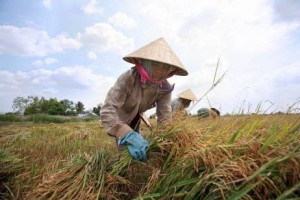
The National (UAE) | Dec 5, 2010
Tom Arnold
Gulf nations need to step up investments in African and South East Asian farmland if the region is to play its part in averting a global food crisis, agriculture experts say.
Securing land in Africa could benefit the continent by increasing agricultural production while ensuring sufficient future supplies of food for the Gulf, said Kanayo Nwanze, the president of the International Fund for Agricultural Development.
"It can be a win-win situation," said Mr Nwanze, whose organisation, based in Rome, is an agency of the UN focusing on supporting agricultural development projects. "Putting the right guidelines in place on responsible investment in agriculture where land-poor countries invest in land-rich countries can be a right approach."
Globally, governments have been urged to take action to avert a food crisis mirroring that of 2007 and 2008. Prices have risen sharply in recent months as the combination of poor harvests in Russia and Pakistan, stockpiling by large countries such as China and India, and trade barriers led to supply pressures.
The Gulf remains vulnerable to volatility in the price of food as it imports about 80 per cent of what its population requires.
Inflation has edged slowly higher in most parts of the GCC this year, driven by food price rises. The cost of vegetables has gone up by more than 9 per cent in the first nine months in Dubai, according to figures from the emirate's statistics centre.
Swathes of farmland are already owned by GCC governments in countries such as Azerbaijan and Mozambique. The region has been urged to increasingly target areas of the world including Africa and South East Asia, where levels of food production have not yet reached their maximum potential.
Africa accounts for a large proportion of the globe's production of wheat, maize and other crops, while Asia produces more than 90 per cent of the world's rice.
Such steps were necessary if the region was to help prevent a global food crisis, said Fan Shenggen, the director general of the International Food Policy Research Institute (IFPRI), a global think tank based in Washington.
"This part of the world will gain from more food supply and more stable food supply and that part of the world will gain from more investment," he said on the sidelines of the World Economic Forum's Summit on the Global Agenda in Dubai last week.
"By investing in Africa, the Gulf can really help the region by bringing new technologies, to access the market here and also to increase employment."
John Mahama, the vice president of Ghana, revealed yesterday that the African nation was in talks with Qatar to set up a joint venture by early next year to produce food for both countries.
Since June, prices of wheat and maize have risen by 60 per cent and 50 per cent, respectively, according to the IFPRI.
It released a report last month reflecting on the causes of the food crisis of 2007 and 2008.
Higher oil prices and growing demand for biofuels that diverted food crops such as corn into energy production, a weaker dollar and volatility in trade were among the problems, it concluded.
"Right now we are facing some dangerous trends seen before," said Mr Shenggen. "Urgent action is needed by governments to avoid another crisis."










